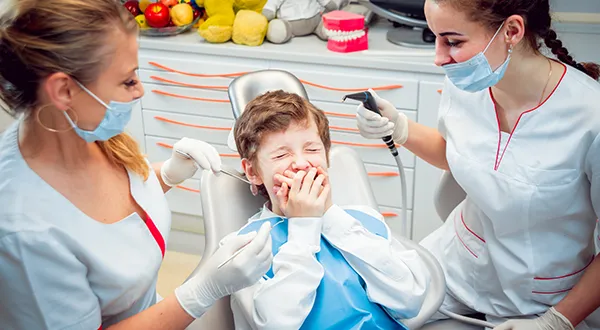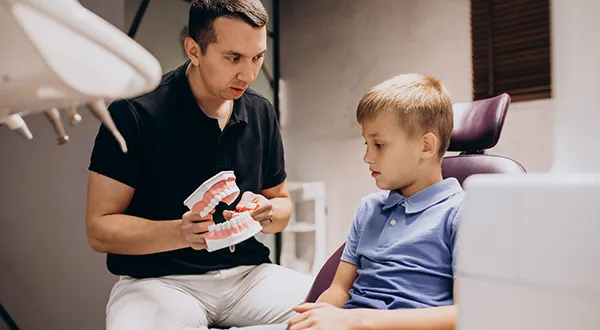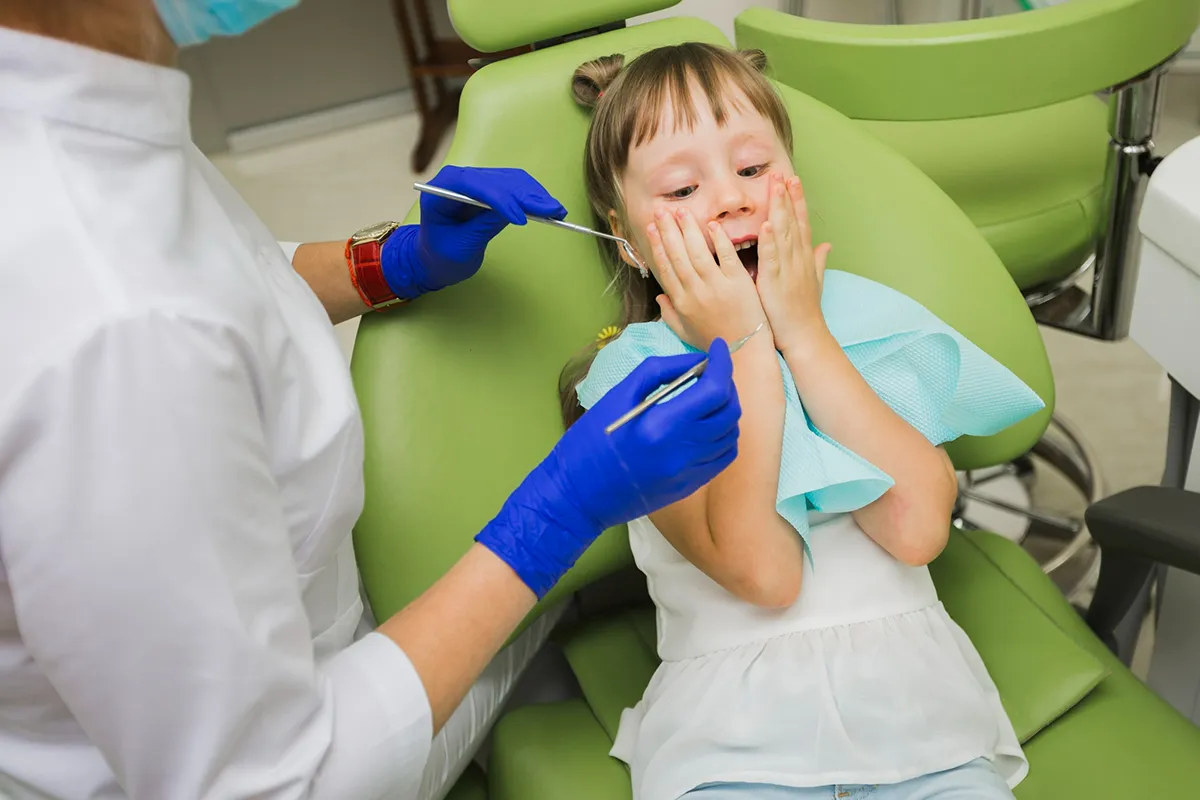Managing Children’s Dental Anxiety
Strategies for Parents to Help Children Overcome Dental Anxiety and Build a Positive Attitude Toward Dental Visits
Dental anxiety refers to the apprehension or fear individuals feel in anticipation of dental procedures or visits. This anxiety is not exclusive to adults; children can also be significantly affected by dental fear.
Addressing children's dental anxiety involves employing a variety of supportive strategies. These include selecting a child-friendly dental practice, gradually exposing the child to the dental environment, implementing positive reinforcement, and fostering open communication between parents, children, and dental professionals.
Taking an early and proactive approach can help alleviate the negative impact of dental anxiety on a child's oral health and overall well-being. Moreover, these interventions contribute to reducing the fear associated with dental treatments.
Children who feel at ease in the dental environment are less likely to postpone or avoid such treatments. This blog explores strategies to help children overcome dental anxiety, visit the dentist fearlessly, and maintain optimal oral health.
How Does Dental Anxiety Affect Your Child?
- Avoidance of Dental Visits:
Children with dental fear may develop a habit of avoidance of routine check-ups and necessary treatments. This avoidance can result in neglecting oral health, potentially leading to more significant dental issues in the long run.
- Delayed Treatment:
Children may delay seeking necessary dental treatment when dental anxiety is present. This delay can allow dental problems to progress, leading to more complex and invasive procedures. Studies indicate that up to 20% of children may delay seeking necessary dental treatment because of dental anxiety.
- Negative Impact:
Dental anxiety can have a direct impact on a child's oral health. The reluctance to undergo regular dental check-ups and cleanings can contribute to the development of cavities, gum disease, and other oral health issues.
- Emotional Distress:
Dental fear can cause emotional distress in children, leading to heightened stress levels and potential negative associations with dental care. This emotional impact may extend beyond the dental setting, affecting the child's overall well-being.
- Development of Dental Phobia:
Prolonged and untreated dental anxiety can escalate into a more severe condition known as dental phobia. Dental phobia is characterized by an intense, irrational fear of dental procedures, often causing extreme stress and avoidance behaviors.

- Impact on Future Dental Habits:
Children who experience dental anxiety may develop negative attitudes toward oral hygiene practices. The reluctance to regularly brush and floss may persist into adulthood, increasing the risk of dental issues later in life.
- Influence on Parental Attitudes:
A child's dental anxiety can also influence the attitudes of parents or caregivers. If a parent shares similar anxieties, it makes it challenging to address and overcome dental anxiety within the family.
- Communication Barriers:
Dental fear can create communication barriers between the child and the dentist. Fear may prevent the child from expressing their concerns or symptoms effectively, hindering the dentist's ability to provide appropriate care.
Strategies for Managing Dental Anxiety
It's not unusual for children to experience dental anxiety. Still, as a parent, there are practical approaches you can use to assist your child in conquering their fears and fostering a positive outlook on dental visits. Let's explore a few of these here.
- Choose a Child-Friendly Dental Practice:
Seek out a friendly dental practice specializing in pediatric care. Pediatric dentists undergo specialized training to manage children's dental anxiety and ensure the dental experience is enjoyable.
- Familiarize Your Child with the Dental Environment:
Before the dental visit, take your child to the dental office for a casual tour. Let them meet the staff and see the dental instruments in a non-threatening context. Familiarity can ease anxiety.
- Positive Reinforcement:
Encourage positive behavior by offering rewards for good dental visits. It could be a small treat, extra playtime, or a special privilege. Consider creating a reward chart at home that tracks good oral hygiene habits.
- Explain Dental Procedures in Simple Terms:
Avoid scary words and focus on the importance of dental care for keeping their teeth strong and healthy. Show them pictures or videos for children illustrating what to expect during a dental visit.

- Role Play at Home:
Create a playful scenario where you take turns being the dentist and the patient. It can help demystify dental procedures and make them seem less intimidating. Use a toothbrush to mimic dental tools, and let your child play the role of the dentist to build a sense of control.
- Interactive Apps and Games:
Explore interactive dental health apps or games designed for children. These educational tools can provide information in a fun and engaging way, making the dental experience more familiar and less intimidating.
- Breathing Exercises:
Teach your child simple breathing exercises to promote relaxation. Inhaling slowly and deep exhaling can help calm nerves and reduce anxiety. Practice these techniques together before dental appointments.
- Regular Dental Check-ups:
Consistency helps build familiarity and reduces anxiety associated with the unknown. Underline the crucial role of scheduled dental visits in achieving and sustaining optimal oral well-being.
- Address Dental Emergencies Promptly:
Accidents happen, and addressing dental emergencies on time is crucial. Know the contact details of an emergency dentist and educate yourself on basic first aid for dental injuries. This preparation can reassure your child that you can handle unexpected situations.
- Stay Calm During Appointments:
Children often pick up on their parents' emotions. Stay calm and composed during dental appointments to help your child feel secure.
- Sedation Options:
Discuss sedation options with the pediatric dentist if your child has severe dental anxiety. Conscious sedation or nitrous oxide (laughing gas) can soothe your child during dental procedures.
- Post-Visit Celebrations:
Establish post-visit celebrations to reinforce positive experiences. Plan a unique activity or outing after dental appointments to create positive associations with the dental journey.
“Dental anxiety in children is more than just a fear; it’s a hurdle that impacts their well-being.”
How Do You Foster a Positive Attitude Toward Dental Visits?
Fostering a positive attitude toward dental visits in your child involves a combination of proactive measures, consistent communication, and a supportive environment. Here are strategies to help build a positive outlook:
- Introduce your child to the dental environment early in their life. Early exposure helps normalize dental care.
- Choose a pediatric dentist with expertise in treating children.
- Use positive and age-appropriate language when discussing dental visits. Avoid using words that may sound frightening or create unnecessary anxiety.
- Do share your own experiences of regular dental care and their benefits. Children often model their behavior after their parents or caregivers.
- Incorporate dental education into playtime. Use dolls, toys, or storybooks to illustrate simple dental procedures. Make it an engaging and fun learning experience.
- Encourage your child to ask questions about the dental visit. Addressing their concerns and providing honest answers helps build trust and reduces anxiety.
- Establish a routine for dental visits. Consistency helps create predictability, making dental appointments a regular and expected part of their healthcare routine.
- Use positive imagery to describe the dental office. Highlight colorful decorations, friendly staff, and the caring nature of the dental team. Paint a picture that contrasts with common negative stereotypes.
Final Thoughts
Incorporating supportive strategies, such as gradual exposure, positive reinforcement, and transparent communication, plays a crucial role in easing anxiety. Timely intervention and a proactive approach are fundamental in minimizing the adverse effects of dentophobia.
Contact your kids' dentist in Stockton, Dr. Sajjad Rizvi, D.D.S. at Happy Kids Dental, to learn how to manage children's Dental Anxiety.
Resource:
Preventative Care for Children: Tips for Good Oral Hygiene
*This media/content or any other on this website does not prescribe, recommend, or prevent any treatment or procedure. Therefore, we highly recommend that you get the advice of a qualified dentist or other medical practitioners regarding your specific dental condition*
Subscribe To Our Newsletter
Get Updates And Learn From The Best


